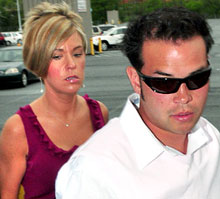The Hollywood Reporter obituary was simple:
John Hughes, director of “The Breakfast Club,” “Ferris Bueller’s Day Off,” “Planes, Trains and Automobiles” and “Home Alone,” died of a heart attack Thursday. He was 59. Hughes died while taking a morning walk during a trip to Manhattan to visit family. He is survived by his wife of 39 years, Nancy, two sons, John and James, and four grandchildren.
But Hughes left a complex and multifaceted legacy: for a generation of actors, writers, and those of us who were ever teenagers, the films that he wrote and directed – which also include “Sixteen Candles,” “Pretty in Pink,” “Weird Science,” and “Some Kind of Wonderful” – made an everlasting impact on our pop culture awareness and in our consideration of our relationships: with friends, romantic prospects, and authority.
You could make any number of impact-related arguments. Without “Sixteen Candles” and “The Breakfast Club,” there’d be no Weitz Brothers, or Kevin Smith, or Judd Apatow, and therefore no “American Pie,” or “Clerks,” or “Superbad.” Without John Hughes, there’d be no Brat Pack, no group of actor-icons for our generation: Anthony Michael Hall, Emilio Estevez, Ally Sheedy, Eric Stoltz, Mary Stuart Masterson, Judd Nelson, Matthew Broderick, Andrew McCarthy, John Cusack, Jennifer Grey, Charlie Sheen…without the Hughes films that launched them, they might have had very different careers (or, in some cases, no careers at all).
You could argue that Hughes set a bar for writing equally sympathetically for men and women, or rather, for teenage girls and boys, a mantle that has been taken up by appallingly few contemporary writers (also known as the Joss Whedon Exception). You could point out that Hughes perfectly and simultaneously nailing girls’ romantic expectations alongside boys’ search for social acceptance and, yes, of course, horniness – note the twin quest plotlines of “Sixteen Candles”: Samantha Baker (Ringwald – who had twins earlier this month) is looking for love, while Anthony Michael Hall is looking for “underpants…girls’ underpants.”
And Hughes knew that teens could be cruel: witness the way “The Breakfast Club” “criminal” tortures “the prom queen” until she cries, or forces an embarrassing confession from the nerd, which is met with laughter. You could try to imagine the current TV scene: likely without such shows as Buffy, Veronica Mars, Gossip Girl, 90210, How I Met Your Mother, Secret Life of an American Teenager, etc.
I admit it: when I was a teenager, I suffered from John Hughes delusions. I kept thinking that my dream guy was going to ask me to prom; that suddenly my best friend would see me as a girl instead of as his source of advice about other girls; that I’d be smart or daring enough to take the day off from school and do whatever I wanted, without getting caught. Even today, there are reminders everywhere, especially from “The Breakfast Club.” When anyone says “social” – which these days, since I’m also a social media consultant, is often – my brain can’t not add, “demented and sad, but social.” I used to live around the corner from Ally Sheedy. And if I even think about any of Judd Nelson’s dialogue from that film, it’ll loop through my head for hours.
I knew that it was all fiction. But for a teenager, such fictions – where just, humble underdogs get everything they want – are dreams of freedoms beyond the scope of our own control.
The opening frame of “The Breakfast Club” features a quote from David Bowie’s “Changes”: “…and these children that you spit on, as they try to change their worlds are immune to your consultations. They’re quite aware of what they’re going through…” John Hughes was also aware of what we were going through. He understood us, knew what we needed, and gave it to us. He will be missed. [Cue music: intro to “Don’t You (Forget About Me),” by Simple Minds]


